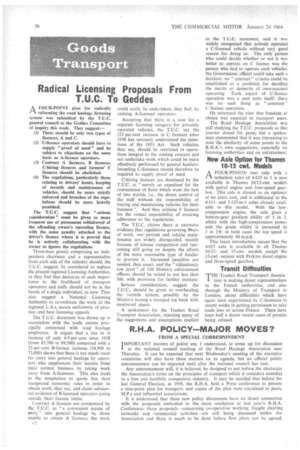Radical Licensing Proposals From T.U.C. To Geddes
Page 38

If you've noticed an error in this article please click here to report it so we can fix it.
A FOUR-POINT plan for radically ri reforming the road haulage licensing system was submitted by the T.U.C. general council to the Geddes Committee of inquiry this week. They suggest:1) There should be only two types of licences, A and C.
(2) C-licence operators should have to supply "proof of need" and be subject to objections on the same basis as A-licence operators.
(3) Contract A licences, B licences, C-hiring licences and farmers' F licences should be abolished.
(4) The regulations, particularly those relating to drivers' hours, keeping of records and maintenance of vehicles, should be more strictly enforced and breaches of the regulations should be more heavily punished.
The T.U.C. suggest that "serious consideration" must be given to more frequent use of permanent withdrawal of the offending owner's operating licence, with the same penally attached to the driver's licence where it is proved that he is actively collaborating with the owner to ignore the regulations.
Three-man panels comprising an independent chairman and a representative from each side of the industry should, the T.U.C. suggest, be considered to replace the present regional Licensing Authorities, as they feel that decisions of such importance to the livelihood of transport operators and staffs should not be in the hands of a single individual, as now. They also suggest a National Licensing Authority to co-ordinate the work of the regional L.A.s, secure uniformity of practice, and hear licensing appeals.
The T.U.C. document was drawn up in association with the trade unions principally concerned with road haulage employees. It argues that a rise in' A licences of only 6-9 per cent since 1938 (from 83,700 to 89,500) compared with a 33 per cent 11-licence increase (54,900 to 73,000) shows that there is too much room for entry into general haulage by operators who supplement their income from their normal business by taking work away from A-licensees. This also leads to the temptation to quote less than recognized economic rates in order to obtain work, they say, and claim substantial evidence of B-licensed operators going outside their licence limits.
Contract A licences are condemned by the T.U.C. as "a convenient means of entry" into general haulage by those unable to obtain A licences; the work c2 could easily be undertaken, they feel, by existing A-licensed operators.
Accepting that there is a case for a separate licensing category for privately operated vehicles, the T.U.C. say the 235 per cent increase in C licences since 1938 has seriously undermined the intentions of the 1933 Act. Such vehicles, they say, should be restricted to operations integral to the owning concern and not undertake work which could be more effectively performed by general hauliers. Intending C-licensees should therefore be required to supply proof of need.
C-hiring licences are dismissed by the T.U.C. as "merely an expedient for the convenience of firms which want the best of two worlds, i.e., the direct control of the staff without the responsibility of buying and maintaining vehicles for their business ". And they criticize F licences for the virtual impossibility of ensuring adherence to the regulations.
The T.U.C. claims there is extensive evidence that regulations governing liturs of work, rest periods and vehicle maintenance are widely disregarded, mainly because of intense competition and ratecutting still going on despite the efforts of the more reasonable type of haulier to prevent it. Increased penalties are needed, they assert, and the "ridiculously low level" of 150 Ministry enforcement officers should be raised to not less than 500, with provision for further increase.
Serious consideration, suggest the 'f.U.C., should be given to overhauling the 'records system, possibly by the Ministry issuing a stamped log book with numbered sheets.
A spokesman for the Traders Road Transport Association, rejecting many of the suggestions and assumptions implicit in the TALC. statement, said it was widely recognized that nobody operated a C-licensed vehicle without very good reason for doing so. The only person who could decide whether or not it was better to operate on C licence was the person who had to operate such vehicles. No Government official could take such a decision; no " external" criteria could be established as a yardstick for deciding the merits or demerits of own-account operating. Each aspect of C-licence operation -was a unit unto itself; there was no such thing as " common " C licence operation.
He reiterated the view that freedom of choice was essential to transport users.
The Road Haulage Association was still studying the T.U.C. proposals as this journal closed for press, but a spokesman commented that it was interesting to note the similarity of some points to the R.H.A.'s own suggestions, especially on licensing authorities and on enforcement.
New Axle Option for Thames 10-12 cwt. Models
A FOUR-PINION rear axle with a PI reduction ratio of 4.625 to 1 is now available in Thames 10/12-cwt. models with petrol engine and four-speed gearbox. This axle is classed as an optional at no extra cost, and is additional to the 4.111and 5-125-to-I axles already available in this model. With the lowcompression engine, the axle gives a bottom-gear gradient ability of 1 in 3, whilst with the high-compression power unit the grade ability is increased to 1 in 2.8: in both cases the top speed is approximately 60 m.p.h.
This latest introduction means that the 4-625 axle is available in all Thames 10/12and 15-cwt. models except the 15-cwt. version with Perkins diesel engine and three-speed gearbox.
Transit Difficulties
THE Traders Road Transport Association is making direct representations to the French authorities, and also through the Ministry of Transport in London, about difficulties which have again been experienced by C-licensees in recent weeks in getting permission to take loads into or across France. There have been half a dozen recent cases of permits being refused.
























































































































